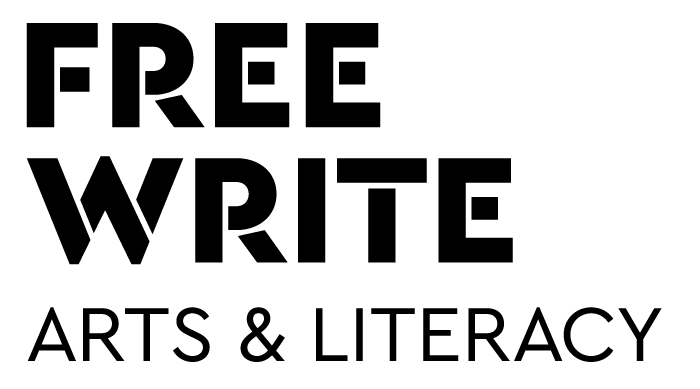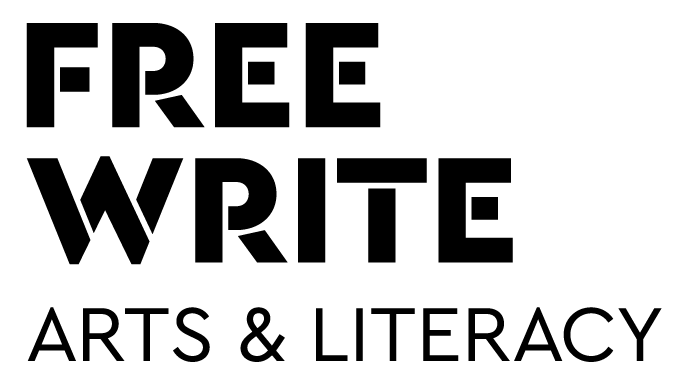ASSESSMENT
Qualitative & Quantitative Outcomes
How does Free Write’s programming advance youth development?
OBJECTIVES:
Building problem solving and persistence capacity
Free Write’s programming shifts young people’s perceptions of their own problem solving skills, of their ability to tolerate frustration, of their capacity to heal from past traumas, and of their possession of under-recognized talents, interests, and aptitudes.
Shifting self perception and perception of others
Free Write’s programming results in the acquisition of skills which shift young people’s perceptions of who they are, what choices they can make, and what opportunities and resources they can access. In the Creative Writing department, it means exposing youth to work in which the analysis of conflicts, responses to injustice, and evolving visions of self are explored and deepened. In the Visual Arts department, this means creating multiple modes for self-representation and for analyzing how others are represented. Participants in the program move from perceiving strength as being about what one takes to being about what one has to offer. It is an asset-based approach. Shifts in self-perception must begin with one’s understanding of which strengths one already has
Artistic and technical skill development
Free Write’s instruction is predicated on the notion that any new learning expands the language/s wielded by the youth (literacy). Expanded language offers a variety of options for response to stimuli, reducing self-destructive responses to conflict. Furthermore, Free Write’s programming builds participants’ confidence and competence in new skill acquisition. Free Write does so by developing creative expression and employable new technology skills, by providing new options for young people who have in the past perceived negative choices as the only pathways open to them.
Future orientation
Expanded literacy (in several artistic norms) means expanded long term vision as a way to name possibilities within one’s future. Free Write’s programming shifts young people’s short-term, impulsive decision making processes into longer term commitments to their own goals, accomplishments and victories.
Familiarity with the juvenile justice system
Free Write has worked within the juvenile justice system since Free Write’s inception, is deeply familiar with the complexities of the system, and is skilled at guiding young people toward positive pathways within those complexities.
QUANTITATIVE OUTCOMES:
Free Write measures its effectiveness in reaching its Objectives by tracking its participant’s outcomes in the following areas of development:
ARTISTIC AND TECHNICAL SKILL DEVELOPMENT
confidence and competence in acquiring new technical skills, positive risk-taking, and recognizing and acting upon one’s own creative capacities
FUTURE ORIENTATION
ability to plan into the future, developing hope for and pride in long term accomplishments, and taking responsibility for one’s own goals and the consequences of one’s actions
CRITICAL THINKING
ability to give and receive feedback, to be reflective about one’s choices, to articulate one’s perceptions and assumptions, to identify both strengths and weaknesses in one’s own work and in the work of others, and to adjust one’s choices based on analytical thought and feedback from others
PRODUCTIVE RELATIONSHIPS
collaboration, cooperation, compromise, connections, contact and identification with positive role models
SELF EXPRESSION
production of original literary and visual artworks communicating authentic representation of the young person’s point-of-view, and experiencing one’s expressions as received and respected by others
REVISED SELF-IMAGE
recognizing one’s own positive capacities, receiving positive recognition, giving to others
DATA COLLECTION:
WORK SAMPLES
Student work is regularly collected, dated, and documented, creating a portfolio for each young person of their development over time.
FIELD NOTES
Field notes, coded for student confidentiality, are recorded on the development of each young person over time.
IN-TAKE, MID-COURSE, AND EXIT INTERVIEWS
Participants are interviewed upon entering each program project, at mid-course of each project, and at the end of each project. These interview protocols track shifts in:
- Willingness to engage in positive new behaviors
- Ability to receive feedback – both constructive and appreciative
- Self analysis and transformations in self-perception and behavior
- Respect for and valuing of others
- Expanded world view and greater sense of options
improvement in
SELF EXPRESSION
improvement in
REVISED SELF-IMAGE
improvement in
CRITICAL THINKING
improvement in
PRODUCTIVE RELATIONSHIPS
PATTERNS OF TRANSFORMATION:
In addition, analysis of the data has evidenced a consistent pattern of transformation in young people who have participated in the program:
Hesitancy
→
Compliance
→
Self-expression
→
Critical thought
→
Expanded world view
Sample student interview responses typifying each stage of development:
Hesitancy: “Ms. Harris said, ‘Do you want to go to Free Write?’ I said, ‘I guess.’”
Compliance: “I’m good with anything y’all come up with.”
Self-Expression: “I was thinking about trying to put into words, into a piece, how we live every day. The emotions I feel as I go through my day.”
Critical thought: “I learned how to write more. I (usually) hate writing and reading. Now I know how to control my patience, because I really don’t have it. You’re going have to wait for things in life. I can’t jap out about it.”
Expanded world view: “I’ve learned to write about issues that I observe not only in myself but in other people. I’ve learned to write about issues bigger than just myself, such as poverty, violence, hypocrisy, privilege, wasted potential, wasting time, a lot of issues that affect me but I also see affecting other people.”
QUALITATIVE OUTCOMES
Free Write conducts a regular series of one-on-one interviews with each participant in the program to track shifts in:
Willingness to engage in positive new behaviors
Ability to receive feed back – both constructive and appreciative
Self analysis and transformations in self-perception
Respect for and valuing of others
Expanded world view and greater sense of options
Let’s make an impact
Learn more about our programs and meaningful ways to get involved. Get in touch

